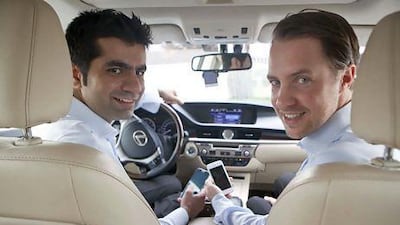There is perhaps nothing like being faced with your own mortality to make you reconsider your life's purpose.
For the former McKinsey consultant Magnus Olsson it was an aneurysm deep inside his brain that provided the catalyst. Not only was he lucky to survive the initial bleeding, but also the subsequent operations to fix it.
After his recovery, Mr Olsson took some time off in Thailand, sat with some monks and reflected.
"I didn't find out the real meaning [of life] but found out I am supposed to build something, something big," he says. At the age of 15, while still at school, Mr Olsson had founded a small IT consultancy in his hometown of Gothenburg in Sweden.
When he went off to university he handed over his clients to a competitor. It wasn't a big sale but it paid for his college expenses.
He decided to return to entrepreneurship and, along with another former McKinsey colleague, Mudassir Sheikha, began figuring out what business to start.
Before McKinsey, Pakistan-born Mr Sheikha had worked in Silicon Valley for a decade where he had some failures and finally a big success - a service called DeviceAnywhere, which made it easier for mobile app developers to test their product across a large number of different devices and phones.
The pair considered ideas in education, health care, even a fish farm. Eventually, agreeing they were both technology geeks at heart, they decided on a business in the Middle East in which technology would make a real difference.
They looked into ground transportation. As consultants they had travelled the world and had noticed that while airlines and hotels are quite seamless - with options to book and check in online - taxis are less reliable.
Readers will be familiar with the issues: a pre-ordered car's failure to appear; the driver's unfamiliarity with roads; the lack of payment options and, frequently, the driver's lack of change for cash payments; the paper receipts that are inevitably mislaid.
"We felt there was a bit of pain here, that we must be able to do better," Mr Olsson says. "We wanted to make ground transportation reliable and convenient and a little bit fun."
They decided on a limo booking service called "Careem". In Arabic, kareem - typically spelt with a "k" - means generous. They went with a "c" because they are in the car business but they also wanted the spirit of generosity to underpin the business. Central to the system is the Careem app and GPS technology. When a customer opens the app, it automatically finds his location, then asks for the destination. The system then calculates an approximate price for the ride.
The customer selects the booking time and if it's immediately, the app searches for the closest available Careem car. All Careem cars are fitted with a device that picks up the car request message. When a driver accepts the booking, the customer will see the driver's name, his location, his reliability rating, and an estimate of how far it will take to arrive at the pickup point.
The customer can track the driver's progress on his smartphone screen. The driver has navigation technology and knows exactly where the customer is. The customer is also sent the car model and its number plate.
The customer's payment details are stored and processed automatically and at the end of the trip a receipt is delivered to the app and via email.
As part of its kareem policy, drivers get training and customers get to rate each journey; if they are not happy a member of the Careem staff will look into why. So far, in 95 per cent of cases customers have rated their trips with four or five stars, according to Mr Olsson.
Booking with Careem is more expensive than hiring a local taxi because of its premium service but prices compare favourably to other limo companies.
The business was initially funded by the founders but an institutional investor is now on board to help the business grow in the UAE and in the region. Careem is already operating in Doha and is piloting in Riyadh.
"The commission that we keep is quite small and so for this to break even it has to be big scale," Mr Olsson explains. "That's why we are eager to expand. We think it will take us two years to be close to breaking even."
It seems that Mr Olsson's plans to build "something big" are coming to bear.

